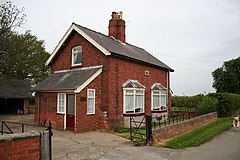Broadholme
| Broadholme | |
|---|---|
 The Lodge cottage at Broadholme |
|
| Broadholme shown within Lincolnshire | |
| OS grid reference | SK892742 |
| • London | 120 mi (190 km) S |
| District | |
| Shire county | |
| Region | |
| Country | England |
| Sovereign state | United Kingdom |
| Post town | Lincoln |
| Postcode district | LN1 |
| Police | Lincolnshire |
| Fire | Lincolnshire |
| Ambulance | East Midlands |
| EU Parliament | East Midlands |
| UK Parliament | |
Broadholme is a village and civil parish in the West Lindsey district of Lincolnshire, England. It is situated 5 miles (8 km) west from the city and county town of Lincoln, and less than 1 mile (1.6 km) south from the A157 road and the village of Saxilby. According to the 2001 Census it had a population of 88. At the 2011 census the population remained less than 100 and is now included in the civil parish of Scampton.
The Premonstratensian Broadholme Priory was founded adjacent to the village at sometime after 1154. The priory was one of only two female priories of that order in England (the other being Orford Priory). The priory was dissolved in 1536 as part of King Henry VIII's Dissolution of the Monasteries. The site is currently occupied by Manor Farm, which may incorporate part of the former monastic buildings, although none are visible.
The Imperial Gazetteer of England and Wales (1870–72) recorded parish as containing 550 acres (2.2 km2), and the village as having a population of 115, spread across 22 houses.
The village and parish of Broadholme was historically part of Nottinghamshire, and lay within the Newark and Sherwood district. In 1986 the Local Government Boundary Commission suggested that the parish of Broadholme, and a small part of the neighbouring parish of Harby, be transferred from Nottinghamshire to Lincolnshire. The primary reasoning behind the suggestion was that the village could not be accessed by road from Nottinghamshire without passing through Lincolnshire, and thus they felt it might be easier to provide council services from Lincolnshire. Broadholme is also closer to the village of Saxilby in Lincolnshire than it was to the nearest Nottinghamshire village, which is Harby. The commission suggested that the villagers might feel a closer affinity to Saxilby.
...
Wikipedia

